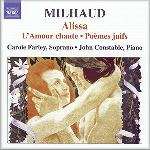|
Back
09/21/2015
Darius Milhaud: Alissa, Opus 9 – L’Amour chante, Opus 409 – Poèmes juifs, Opus 34
Carole Farley (Soprano), John Constable (Piano)
Recording: Concert Hall of the Belgian Radio and Television, Brussels, Belgium (February 2-4, 1992) – 71’28
Naxos # 8.572298 – Booklet in English and French

   
It’s unclear whether this CD is a reissue or long delayed release of music recorded more than twenty years ago. Copyright issues (which prohibited inclusion of texts for Poèmes juifs) may be the explanation. While it would be nice to report the disc is worth the long delay, the performances are seldom more than competent and even major admirers of Milhaud may be less than thrilled with the world premiere recording of the composer’s late cycle, L’Amour chante. Carole Farley is best known as an opera soprano and her singing throughout the disc has a bland, rather generic quality which singers were adopting by the later 1950s for (then) contemporary music they may not have studied or understood with substantial comprehension. John Constable is a fine pianist and accompanist who brings rather more range of timbre and dynamics than does Ms. Farley.
Alissa may be the best known of the three cycles presented here, especially the lilting melody in the third song, Jérôme et Alissa. The work’s penultimate movement is an exquisitely liquid piano solo which Mr. Constable plays with an admirable blend of fine phrasing and sensuous legato, leading to the final Journal d’Alissa which is long, episodic and dramatic. Ms. Farley arguably does her best work here, invoking the drama (derived from a Gide story) at the cycle’s heart.
L’Amour chante, composed in 1962 and first performed at Lincoln Center in 1965, is a collection of love songs adapted from writers including de Musset and Verlaine. If anything unifies this selection it may be the ongoing back-and-forth contrasts between slower then more animated works. The opening piano chords of Veillés at once recall Claude Debussy’s La Cathédrale engloutie, while Plusieurs de leurs corps dénués further suggests Debussy in naughty ‘droll’ mode. Overall, however, these songs are interesting but did not break new ground for the prolific composer.
Poèmes juifs, Opus 34, which concludes the disc, may well be the highlight and again shows Milhaud borrowing from earlier composers while bringing his own perspective to revisited materials. The opening Chant de Nourrice is striking for its seldom changing piano accompaniment echoing Chopin’s Berceuse for piano. Chant de Forgeron is appropriately vigorous, while the final Lamentation slips away with a kind of parting anonymity.
This CD will interest connoisseurs of Milhaud’s music, for sure, though many will likely be hoping for more challenging future interpretations of this repertoire.
Charles Pope Jr.
|